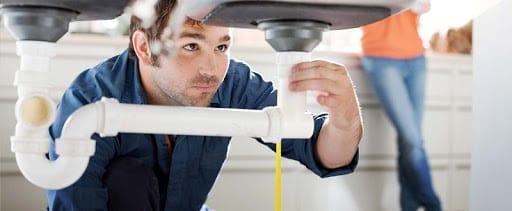
The Top 10 Signs You Need to Call a Plumber
In every homeowner’s life, there comes a time when the inevitable happens: plumbing issues. Whether it’s a small leak or a significant blockage, knowing when to call in a professional can save you both time and money in the long run. Here are the top ten signs that it’s time to pick up the phone and call a plumber.
1. Constantly Running Toilets
If your toilet keeps running long after you’ve flushed it, it may indicate an issue with the flapper valve, the float apparatus, or a leak in the tank. This not only wastes water but can significantly increase your water bill.
2. Slow Draining Sinks
While minor blockages can sometimes be fixed with a plunger or over-the-counter drain cleaner, a sink that consistently drains slowly may be a sign of a more serious blockage deep within your pipes, requiring professional attention.
3. Low Water Pressure
Suddenly experiencing low water pressure can be a sign of multiple issues ranging from a simple faucet aerator problem to more severe problems in your main water line.
4. Discolored Water
If the water from your taps is any color other than clear, it’s time to call a plumber. Brown or reddish water often indicates rust in the pipes, while green or blue water can mean copper or brass corrosion.
5. Foul-Smelling Drains or Sewer Gas Smell
Odors emanating from your drains or a sewer gas smell in your home can indicate blockages, sewer line breaks, or vent problems.

6. Gurgling Sounds
If you hear a gurgling sound coming from your drains, especially after using the washing machine or dishwasher, it could be a sign of a clogged drain or even a problem with your sewer system.
7. No Hot Water
A sudden lack of hot water might indicate a problem with your water heater. This could range from a blown pilot light to more severe issues that can cause leaks or even a burst tank.
8. Visible Water Damage
Signs such as damp spots on walls or floors, peeling paint, or mold growth can be indications of hidden leaks. Addressing these issues promptly can prevent more extensive damage.
9. Frozen Pipes
In colder climates, if you notice a frost buildup on your pipes or experience reduced water flow during winter, you might have frozen pipes. This requires immediate attention as frozen pipes can burst, causing extensive damage.
10. Recurring or Multiple Clogs
If you’re frequently dealing with clogs, especially in multiple fixtures at once, it could be a sign of a bigger blockage further down the system or even issues with your sewer line.
While some minor plumbing issues can be addressed with DIY fixes, it’s essential to recognize the signs of more severe problems that require the expertise of a professional plumber. Being proactive and addressing these issues early can prevent more extensive damage, saving you time, money, and stress in the long run.
Understanding the Costs: What to Expect When Hiring a Plumber
Knowing when to call a plumber is half the battle; understanding how much you can expect to pay for their services is the other. Plumbing costs can vary significantly based on the nature and complexity of the issue, as well as regional differences. Below, we delve into some average costs associated with common plumbing issues.
General Service Rates
Most plumbers charge an hourly rate, which can range from $50 to $150 per hour. Some may also charge a service fee just for coming out, which usually falls between $50 and $100. This fee might be waived if you decide to go ahead with their services.
1. Toilet Repairs
Fixing a running or leaky toilet can cost anywhere from $100 to $200, depending on the issue’s cause. Replacing a toilet can be more expensive, ranging from $200 to $500.
2. Drain Clearing
For a simple clog, you might pay $100 to $250. However, more severe blockages, especially those that require specialized equipment or accessing the main line, can run upwards of $500.
3. Fixing Leaks
Minor faucet leaks can be relatively inexpensive to repair, often around $100 to $150. However, hidden leaks, such as those within walls, can be pricier, often costing between $200 and $1,000 depending on the damage and accessibility.

4. Water Heater Repairs
Common water heater problems, like faulty thermostats or heating elements, usually cost between $150 and $500 to fix. If you need to replace your water heater entirely, expect to pay anywhere from $800 to $2,000, depending on the unit’s capacity and type.
5. Sewer Line Issues
Addressing problems with your sewer line can be one of the more costly plumbing endeavors. Simple repairs may cost between $1,000 and $2,000, while complete replacements can range from $2,500 to $25,000, depending on the length and location of the line.
6. Pipe Repairs
For minor pipe repairs, costs can be as low as $150, but for major repairs or replacements, especially if walls need to be opened or the pipes are underground, costs can rise to $2,000 or more.
Factors Affecting Costs
Several factors can influence your plumbing bill:
- Emergency Services: If you need a plumber outside of regular business hours, you’ll likely pay a premium.
- Experience: A more experienced plumber might charge a higher hourly rate but may also work more efficiently.
- Location: Urban areas with a higher cost of living typically see higher plumbing rates.
Understanding average plumbing costs can help you budget for unexpected issues and make informed decisions when hiring a professional. Always remember to ask for estimates upfront, inquire about any potential additional costs, and consider getting multiple quotes to ensure you’re getting a fair deal. Investing in regular maintenance and addressing minor issues promptly can also help you avoid more costly repairs in the future.
To DIY or Call a Professional Plumber?
Home improvements and repairs can often spark a sense of adventure and a desire to save money by tackling the project oneself. With the plethora of online tutorials and DIY videos, it’s tempting to handle plumbing problems without calling a professional. However, while some minor issues might be safely managed with a DIY approach, others certainly require the expertise of a trained plumber. Let’s weigh the pros and cons.
DIY Plumbing: The Perks and the Pitfalls
Advantages:
- Cost Savings: Buying parts yourself and not paying for labor can save money in the short term.
- Learning Experience: DIY projects can be rewarding and educational. Over time, you’ll develop handy skills for minor fixes.
- Immediate Solutions: If you already have the tools and knowledge, you might fix minor issues faster than waiting for a plumber.
Drawbacks:
- Lack of Expertise: Even with the best tutorial, there’s no replacement for years of professional experience. A minor mistake can escalate a small problem into a major catastrophe.
- Safety Concerns: Incorrect repairs can lead to leaks, mold growth, and even structural damage. Some mistakes can pose direct hazards, such as gas leaks.
- No Guarantees: If a DIY fix goes wrong, you’re on the hook for repairs. In contrast, professionals often offer guarantees on their work.
- Long-Term Costs: A temporary fix may seem successful, but without addressing the root cause, you could face higher costs in the long run.

Risks of DIY Plumbing
- Water Damage: Incorrectly fixing a leaky pipe or incorrectly installing fixtures can result in significant water damage, mold growth, and damage to your home’s structure.
- Gas Leaks: Incorrectly meddling with gas lines is dangerous and can lead to leaks. This not only poses an explosion risk but can also lead to carbon monoxide poisoning.
- Violating Local Codes: DIY projects might not meet local plumbing codes, leading to issues when selling your home or getting insurance.
- Loss of Warranty: Some appliances or parts warranties become void if repairs aren’t done by a licensed professional.
Making the Call
It’s essential to honestly assess your skills and the scope of the problem before diving into DIY plumbing. Minor issues like unclogging a drain or replacing a faucet washer might be within the realm of DIY. However, anything involving gas lines, main water lines, or internal pipe repairs often warrants a professional touch.
When faced with plumbing issues, the allure of saving money by handling the problem yourself is understandable. However, it’s crucial to recognize when a situation is beyond your expertise. Incorrect DIY solutions can lead to more significant issues and expenses down the line. Sometimes, making the smart and safe choice means picking up the phone and calling a professional plumber.
Selecting the Right Plumber for Your Needs
After recognizing the signs that you need a plumber and understanding the pitfalls of diving into a DIY project unprepared, the next logical step is ensuring you select the right plumbing professional. Here’s what to keep in mind:
Reputation Matters
Word of mouth and online reviews can be a great starting point. Hearing or reading about other customers’ experiences can give you a sense of the reliability and expertise of a plumber or plumbing company.
Verify Licensing and Insurance
Most states in the U.S. require plumbers to be licensed. A licensed plumber will have the necessary training and expertise to handle your plumbing issue. Moreover, ensure that the plumber is insured. This will protect you from any liabilities should there be any mishaps during the job.
Get Multiple Quotes
Don’t settle for the first quote you receive. Instead, get estimates from at least three plumbers to ensure you get a competitive rate. But remember, the cheapest quote isn’t always the best. Consider other factors like experience, equipment, and estimated time of completion.
Ask About Guarantees
A reputable plumber will guarantee their work, ensuring that if there are any issues post-repair, they will address them without additional costs.
Emergency Services
Plumbing emergencies can happen at any time. It’s beneficial to know if your chosen plumber offers 24/7 emergency services. This way, you know who to call during unexpected plumbing disasters.
Understand the Scope of the Job
Ensure you’re clear about what needs to be done. A professional plumber should be able to explain the problem, the required solution, and give a clear breakdown of costs. If something doesn’t make sense, don’t hesitate to ask questions.

The realm of plumbing can seem daunting, especially when confronted with unexpected issues. Yet, with the right knowledge about when to call a professional, what risks to avoid with DIY solutions, and how to select the right plumber for the job, you can navigate these challenges effectively. Investing in professional services when necessary not only protects your home but also ensures peace of mind, knowing that the heart of your home’s water system is in good hands.
The Long-term Benefits of Investing in Quality Plumbing
While the initial costs of plumbing repairs or upgrades might seem steep, investing in quality plumbing solutions has significant benefits in the long run.
1. Increased Home Value
High-quality plumbing systems are a key selling point for potential homebuyers. If you ever decide to sell your home, a well-maintained plumbing system can boost its market value.
2. Water Conservation
Modern plumbing solutions are designed to be more water-efficient. By ensuring that your plumbing is up-to-date and functioning properly, you can save thousands of gallons of water each year, translating to lower water bills.
3. Prevention of Costly Repairs
Addressing minor plumbing issues promptly can prevent them from escalating into bigger, more expensive problems. For instance, a small leak, if ignored, can lead to significant water damage that costs a lot more to fix.
4. Improved Health and Safety
Leaky pipes can lead to mold and mildew growth, posing health risks to the household’s inhabitants. Ensuring that your plumbing system is in top shape can prevent such hazards.
5. Energy Efficiency
Hot water leaks can waste energy. By ensuring your plumbing system, especially your hot water systems, are functioning optimally, you can save on energy bills.
6. Peace of Mind
There’s a certain comfort in knowing that your home’s plumbing system is in good condition. You can rest easy, not having to constantly worry about unexpected breakdowns or emergencies.

Sustainable Plumbing
Sustainability is a buzzword in almost every industry, and plumbing is no exception. Eco-friendly plumbing solutions not only save resources but also cut down on utility bills. From low-flow toilets and faucets to solar water heaters and greywater systems, the world of plumbing is evolving rapidly.
If you’re considering upgrading or renovating your plumbing system, it might be worth looking into these sustainable options. Not only do they provide immediate benefits in terms of efficiency, but they also ensure that your home is future-ready, aligning with the global shift towards sustainability.
Plumbing is an integral part of our daily lives, something we often take for granted until a problem arises. By recognizing the signs of plumbing issues early on, understanding the costs associated, and making informed decisions, you can ensure that your home’s plumbing system serves you well for years to come.
Plumbing: More Than Just Fixing Leaks
While the primary thought around plumbing might revolve around fixing leaks or unclogging drains, the scope of plumbing services is vast and encompasses a broad range of functions. Gaining a deeper understanding of what plumbers do can help homeowners appreciate the intricate systems running behind their walls and beneath their floors.
Plumbing System Design
For new constructions or home remodels, designing an efficient plumbing system is crucial. This involves the strategic placement of pipes, fixtures, and appliances to ensure optimum water flow, minimize water wastage, and ensure the longevity of the entire system.
Water Quality
It’s not just about the movement of water; it’s also about its quality. Plumbers play a role in ensuring that the water entering homes is clean and safe for consumption. This includes the installation and maintenance of water softeners, filters, and purification systems.
Gas Plumbing
Many plumbers are also certified in gas fitting, ensuring safe and efficient installation and repair of gas lines. This is particularly crucial because mistakes in gas plumbing can lead to dangerous situations, such as leaks that could result in fires or explosions.
Eco-friendly Installations
With the push towards sustainability, many plumbers are now trained in the installation of eco-friendly fixtures. These include rainwater harvesting systems, greywater systems, and solar water heaters.
Educating Homeowners
An often-overlooked aspect of a plumber’s job is educating homeowners. Knowledgeable plumbers provide invaluable advice on maintaining plumbing systems, spotting potential issues, and implementing water-saving practices.
Emergency Services
Many plumbing issues crop up unexpectedly and can quickly escalate if not addressed immediately. Thus, the role of a plumber extends beyond regular working hours. Many plumbing professionals offer emergency services, ensuring that homeowners have someone to turn to in case of late-night or holiday emergencies.
It’s clear that plumbing extends far beyond the occasional repair. It’s an intricate, multifaceted profession that ensures our homes are safe, efficient, and comfortable. Investing in regular plumbing maintenance and valuing the expertise of these professionals can save homeowners time, money, and potential heartache in the long run.

Essential Maintenance Tips to Prevent Future Plumbing Issues
Keeping your plumbing in top shape requires a proactive approach. By following a set of essential maintenance tips, you can significantly reduce the risk of encountering severe plumbing problems in the future. Here’s a look at some effective measures you can take:
1. Regular Inspections:
Consider having a professional plumber inspect your system at least once a year. They can spot potential problems that might not be evident to the untrained eye.
2. Drain Cleaning:
Over time, hair, soap scum, and other debris can accumulate in your drains, leading to clogs. Make it a habit to clean your drains monthly using natural methods like a mixture of baking soda and vinegar followed by hot water.
3. Water Pressure Check:
High water pressure can wear down your pipes over time. Ensure you regularly check your water pressure using a gauge and adjust it if necessary.
4. Water Heater Maintenance:
Drain and flush your water heater annually to remove sediment buildup. This not only prolongs the heater’s lifespan but also ensures it runs efficiently.
5. Check for Leaks:
Even small leaks can escalate into bigger problems. Regularly inspect faucets, showerheads, and toilet bases for any signs of leaks and address them immediately.
6. Know Your Main Water Shut-Off Valve:
In case of a major leak or plumbing emergency, knowing where the main shut-off valve is located can prevent extensive water damage. Ensure every member of your household knows its location.

7. Avoid Chemical Drain Cleaners:
While they might seem like a quick fix for clogs, chemical drain cleaners can erode pipes over time. Opt for natural solutions or a plumbing snake instead.
8. Insulate Pipes in Cold Climates:
Frozen pipes can burst, leading to significant water damage. If you live in a region with cold winters, insulate your pipes to prevent them from freezing.
9. Be Mindful of What Goes Down the Drain:
Avoid disposing of grease, coffee grounds, and non-biodegradable items in your drains. These can cause clogs and strain your plumbing system.
10. Invest in Quality Fixtures:
When replacing faucets, showerheads, or other plumbing fixtures, it’s worth investing in high-quality products. They may cost more upfront but tend to last longer and come with better warranties.
By adhering to these maintenance tips, you’re not just ensuring the smooth operation of your plumbing system; you’re also preventing costly future repairs. A little attention and regular care can go a long way in maintaining the integrity of your plumbing and ensuring it serves you well for years to come.

Leave a Reply